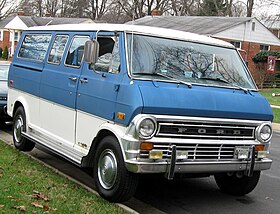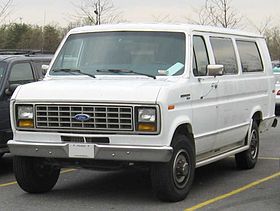Ford Econoline
| Ford E-Series | |
|---|---|
 |
|
| Overview | |
| Manufacturer | Ford |
| Production | 1961–present (limited beyond 2015, only stripped chassis and cutaway cab in production) |
| Model years | 1961–present |
| Assembly |
Lorain, Ohio, United States Avon Lake, Ohio, United States Oakville, Ontario, Canada |
| Body and chassis | |
| Class | Full size van |
| Chronology | |
| Predecessor | Ford F-Series panel van |
| Successor | Ford Transit (United States & Canada) |
| First generation | |
|---|---|

1961–1967 Ford Econoline (customized)
|
|
| Overview | |
| Also called | Ford Falcon Club Wagon Mercury Econoline (Canada) |
| Production | 1961–1967 |
| Body and chassis | |
| Body style | 3-door van 2-door pickup truck |
| Layout | FMR layout |
| Related | Ford Falcon |
| Powertrain | |
| Engine | 144 cu in (2.4 L) Falcon Six I6 170 cu in (2.8 L) Thriftpower Six I6 240 cu in (3.9 L) I6 |
| Transmission | 3-speed manual |
| Dimensions | |
| Wheelbase | 90.0 in (2,286.0 mm) |
| Width | 75.0 in (1,905.0 mm) |
| Height | 76.9 in (1,953.3 mm) |
| Second generation | |
|---|---|

1972–1974 Ford Club Wagon
|
|
| Overview | |
| Production | 1968–1974 |
| Body and chassis | |
| Body style | 3-door van |
| Layout | FR layout |
| Powertrain | |
| Engine | 240 cu in (3.9 L) I6 300 cu in (4.9 L) I6 302 cu in (4.9 L) Windsor V8 |
| Transmission | 3-Speed Manual 3-speed Cruise-O-Matic automatic |
| Dimensions | |
| Wheelbase | SWB: 105.5 in (2,679.7 mm) LWB: 123.5 in (3,136.9 mm) |
| Third generation | |
|---|---|

1983–1991 Ford Club Wagon
|
|
| Overview | |
| Also called | Ford Club Wagon |
| Production | 1975–1991 |
| Body and chassis | |
| Body style | 3-door van |
| Layout | FR layout |
| Platform | Ford VN platform |
| Related | Ford Carousel |
| Powertrain | |
| Engine | 240 cu in (3.9 L) I6 300 cu in (4.9 L) I6 302 cu in (4.9 L) Windsor V8 351 cu in (5.8 L) Windsor V8 460 cu in (7.5 L) 385 V8 6.9 L Navistar diesel V8 7.3 L Navistar diesel V8 |
| Transmission | 3-speed manual 4-speed manual 3-speed automatic 4-speed automatic 5-speed manual |
| Fourth generation | |
|---|---|

1997–2002 Ford Econoline
|
|
| Overview | |
| Also called | Ford Econoline (until 2006; name still used in Mexico according to Ford Mexico's website) Ford Club Wagon (until 1998) Ford Econoline Wagon (1999–2005) |
| Production | 1991–2014 (passenger/cargo van) 1991–present (cutaway/stripped chassis) |
| Model years | 1992–2014 (passenger/cargo van) 1992–present (cutaway/stripped chassis) |
| Body and chassis | |
| Body style | 3/4-door van |
| Layout | FR layout |
| Platform | Ford VN platform |
| Powertrain | |
| Engine | 4.9 L (300 cu in) Truck Six I6 4.9 L (302 cu in) Windsor V8 5.8 L (351 cu in) Windsor V8 7.5 L (460 cu in) 385/Lima V8 Navistar 7.3 L IH IDI Diesel V8 Navistar 7.3 L Power Stroke Diesel V8 4.2 L Essex V6 4.6 L Triton V8 5.4 L Triton V8 6.8 L Triton V10 Navistar 365 CID 6.0 L Power Stroke Diesel V8 |
| Transmission | 4-speed AOD automatic 5-speed TorqShift automatic |
| Dimensions | |
| Wheelbase | 138 in (3,505 mm) |
| Length |
1992–2008 Regular: 212 in (5,385 mm) Extended: 232 in (5,893 mm) 2009– Regular: 216.7 in (5,504 mm) Extended: 236.7 in (6,012 mm) |
| Width | 79.3–79.9 in (2,014–2,029 mm) |
| Height | 80.7–84.1 in (2,050–2,136 mm) |
| Curb weight | 4,773 lb (2,165 kg) |
The Ford E-Series (also known as the Ford Econoline and Ford Club Wagon throughout various stages of its production) is a line of full-size vans (cargo van and passenger van) and truck chassis (cutaway van and stripped chassis) from the Ford Motor Company. Introduced for the 1961 model year as the replacement for the panel van bodystyle of the Ford F-Series, the Ford E-Series has been produced in four distinct generations. After the F-Series and the Australian Ford Falcon, it is the third longest-produced nameplate by the company worldwide.
For the 2015 model year, Ford largely phased out the E-Series cargo/passenger vans in favor of the Ford Transit sold worldwide. As of the 2016 model year, the E-Series is only produced in cutaway-cab chassis and stripped chassis variants. The E-Series is manufactured at the Ford Motor Company Ohio Assembly plant in Avon Lake, Ohio, following the closure of the Lorain Assembly plant in December 2005.
Since 1980, the E-Series has been the best-selling American full-sized van, holding 79.6% of the full-size van market in the United States in 2007, with 168,722 vehicles sold. Ninety-five percent of E-Series sales are to commercial or fleet users, with cargo vans comprising nearly half of production.
Based on the compact Ford Falcon automobile, the first Ford Econoline was introduced to the public on September 21, 1960 for the 1961 model year based on design sketches that were dated 1957. The Ford models were sized to compete with the Chevrolet Greenbrier and the Volkswagen Type 2, which was 172.3 in (4,376 mm) long and introduced in the U.S. market in the 1950s. The Volkswagen van had made an impact on the marketplace, thus both Chevrolet and Ford responded with their own versions. Originally offered as a cargo van, a window van (called the "Station Bus") with or without seats with up to three rows of seating, offering a maximum eight-passenger capacity (which carried the Ford Falcon name), and as a pickup truck. A 165 lb (75 kg) counterweight was fitted over the rear wheels to balance the front-heavy vehicle; this was sometimes removed by later owners.
...
Wikipedia
